Economic Factors Analysis: A Comparison of Vietnam and Hong Kong
VerifiedAdded on 2022/09/25
|5
|999
|30
Report
AI Summary
This report provides an analysis of economic factors in Vietnam and Hong Kong. It examines the advantages and disadvantages of each economy. Vietnam's strengths include high GDP growth, declining debt, low inflation, reduced tariffs, and increased FDI. However, it faces challenges like limited access to credit, weak tax payment systems, corruption, weak intellectual property rights, and a decreasing working-age population. Hong Kong, on the other hand, benefits from high GDP growth, zero import tariffs, high productivity, low corporate tax rates, and its economic connection to the Pearl River Delta. Its weaknesses include vulnerability to global economic downturns, dependence on imported goods, and declining business and consumer confidence. The report concludes by highlighting the economic conditions and potential challenges in both regions, providing a comparative overview of their economic landscapes.
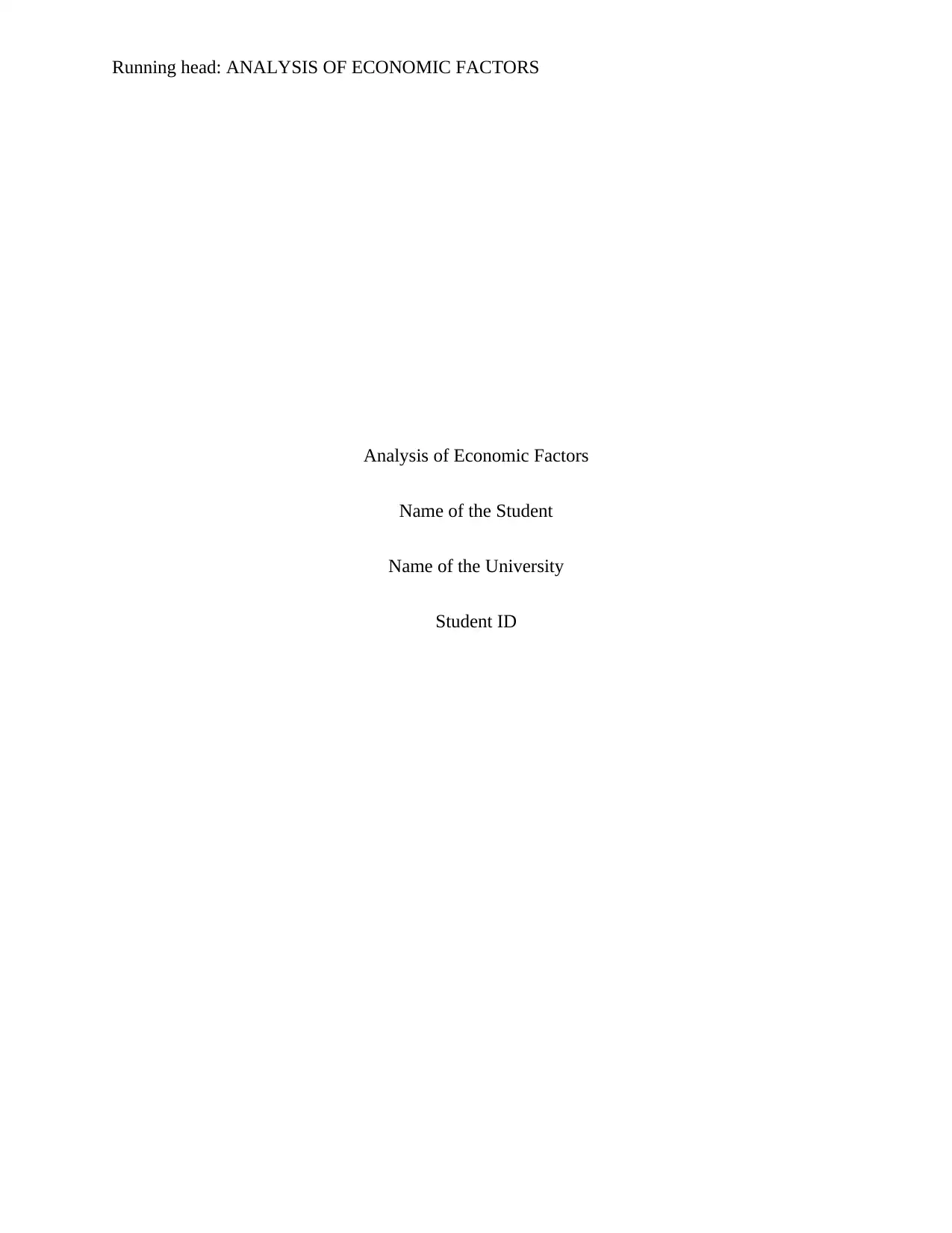
Running head: ANALYSIS OF ECONOMIC FACTORS
Analysis of Economic Factors
Name of the Student
Name of the University
Student ID
Analysis of Economic Factors
Name of the Student
Name of the University
Student ID
Paraphrase This Document
Need a fresh take? Get an instant paraphrase of this document with our AI Paraphraser
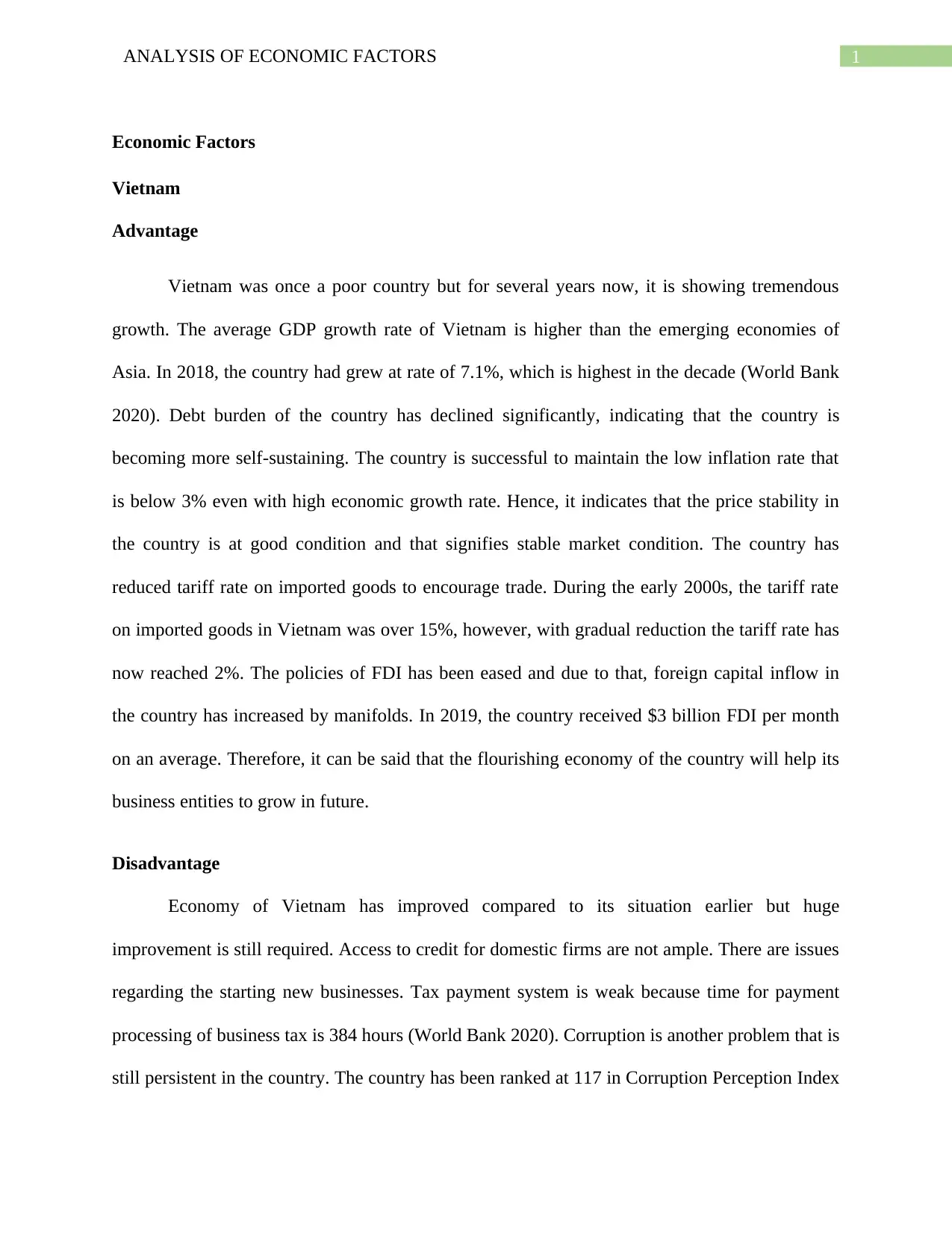
1ANALYSIS OF ECONOMIC FACTORS
Economic Factors
Vietnam
Advantage
Vietnam was once a poor country but for several years now, it is showing tremendous
growth. The average GDP growth rate of Vietnam is higher than the emerging economies of
Asia. In 2018, the country had grew at rate of 7.1%, which is highest in the decade (World Bank
2020). Debt burden of the country has declined significantly, indicating that the country is
becoming more self-sustaining. The country is successful to maintain the low inflation rate that
is below 3% even with high economic growth rate. Hence, it indicates that the price stability in
the country is at good condition and that signifies stable market condition. The country has
reduced tariff rate on imported goods to encourage trade. During the early 2000s, the tariff rate
on imported goods in Vietnam was over 15%, however, with gradual reduction the tariff rate has
now reached 2%. The policies of FDI has been eased and due to that, foreign capital inflow in
the country has increased by manifolds. In 2019, the country received $3 billion FDI per month
on an average. Therefore, it can be said that the flourishing economy of the country will help its
business entities to grow in future.
Disadvantage
Economy of Vietnam has improved compared to its situation earlier but huge
improvement is still required. Access to credit for domestic firms are not ample. There are issues
regarding the starting new businesses. Tax payment system is weak because time for payment
processing of business tax is 384 hours (World Bank 2020). Corruption is another problem that is
still persistent in the country. The country has been ranked at 117 in Corruption Perception Index
Economic Factors
Vietnam
Advantage
Vietnam was once a poor country but for several years now, it is showing tremendous
growth. The average GDP growth rate of Vietnam is higher than the emerging economies of
Asia. In 2018, the country had grew at rate of 7.1%, which is highest in the decade (World Bank
2020). Debt burden of the country has declined significantly, indicating that the country is
becoming more self-sustaining. The country is successful to maintain the low inflation rate that
is below 3% even with high economic growth rate. Hence, it indicates that the price stability in
the country is at good condition and that signifies stable market condition. The country has
reduced tariff rate on imported goods to encourage trade. During the early 2000s, the tariff rate
on imported goods in Vietnam was over 15%, however, with gradual reduction the tariff rate has
now reached 2%. The policies of FDI has been eased and due to that, foreign capital inflow in
the country has increased by manifolds. In 2019, the country received $3 billion FDI per month
on an average. Therefore, it can be said that the flourishing economy of the country will help its
business entities to grow in future.
Disadvantage
Economy of Vietnam has improved compared to its situation earlier but huge
improvement is still required. Access to credit for domestic firms are not ample. There are issues
regarding the starting new businesses. Tax payment system is weak because time for payment
processing of business tax is 384 hours (World Bank 2020). Corruption is another problem that is
still persistent in the country. The country has been ranked at 117 in Corruption Perception Index
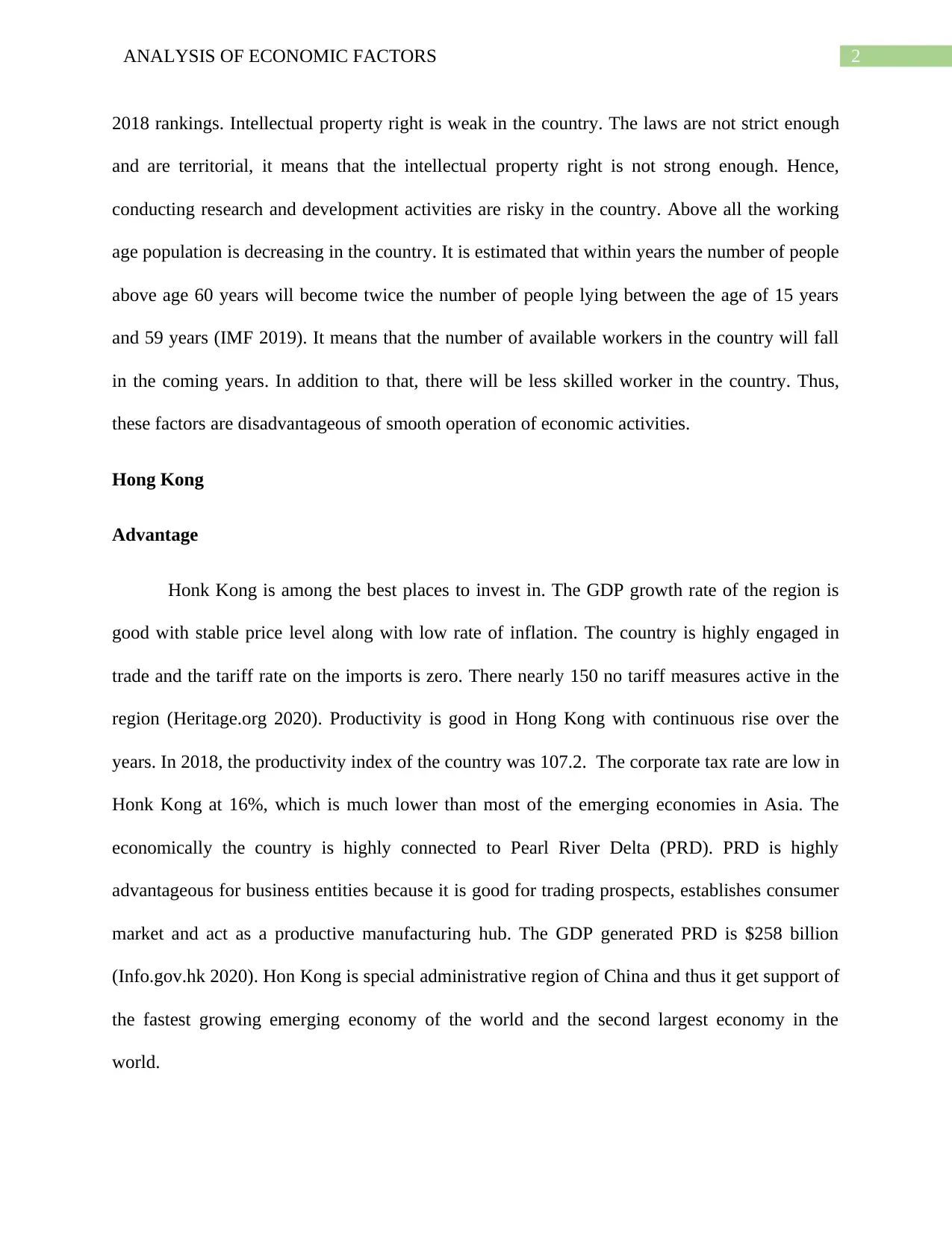
2ANALYSIS OF ECONOMIC FACTORS
2018 rankings. Intellectual property right is weak in the country. The laws are not strict enough
and are territorial, it means that the intellectual property right is not strong enough. Hence,
conducting research and development activities are risky in the country. Above all the working
age population is decreasing in the country. It is estimated that within years the number of people
above age 60 years will become twice the number of people lying between the age of 15 years
and 59 years (IMF 2019). It means that the number of available workers in the country will fall
in the coming years. In addition to that, there will be less skilled worker in the country. Thus,
these factors are disadvantageous of smooth operation of economic activities.
Hong Kong
Advantage
Honk Kong is among the best places to invest in. The GDP growth rate of the region is
good with stable price level along with low rate of inflation. The country is highly engaged in
trade and the tariff rate on the imports is zero. There nearly 150 no tariff measures active in the
region (Heritage.org 2020). Productivity is good in Hong Kong with continuous rise over the
years. In 2018, the productivity index of the country was 107.2. The corporate tax rate are low in
Honk Kong at 16%, which is much lower than most of the emerging economies in Asia. The
economically the country is highly connected to Pearl River Delta (PRD). PRD is highly
advantageous for business entities because it is good for trading prospects, establishes consumer
market and act as a productive manufacturing hub. The GDP generated PRD is $258 billion
(Info.gov.hk 2020). Hon Kong is special administrative region of China and thus it get support of
the fastest growing emerging economy of the world and the second largest economy in the
world.
2018 rankings. Intellectual property right is weak in the country. The laws are not strict enough
and are territorial, it means that the intellectual property right is not strong enough. Hence,
conducting research and development activities are risky in the country. Above all the working
age population is decreasing in the country. It is estimated that within years the number of people
above age 60 years will become twice the number of people lying between the age of 15 years
and 59 years (IMF 2019). It means that the number of available workers in the country will fall
in the coming years. In addition to that, there will be less skilled worker in the country. Thus,
these factors are disadvantageous of smooth operation of economic activities.
Hong Kong
Advantage
Honk Kong is among the best places to invest in. The GDP growth rate of the region is
good with stable price level along with low rate of inflation. The country is highly engaged in
trade and the tariff rate on the imports is zero. There nearly 150 no tariff measures active in the
region (Heritage.org 2020). Productivity is good in Hong Kong with continuous rise over the
years. In 2018, the productivity index of the country was 107.2. The corporate tax rate are low in
Honk Kong at 16%, which is much lower than most of the emerging economies in Asia. The
economically the country is highly connected to Pearl River Delta (PRD). PRD is highly
advantageous for business entities because it is good for trading prospects, establishes consumer
market and act as a productive manufacturing hub. The GDP generated PRD is $258 billion
(Info.gov.hk 2020). Hon Kong is special administrative region of China and thus it get support of
the fastest growing emerging economy of the world and the second largest economy in the
world.
⊘ This is a preview!⊘
Do you want full access?
Subscribe today to unlock all pages.

Trusted by 1+ million students worldwide
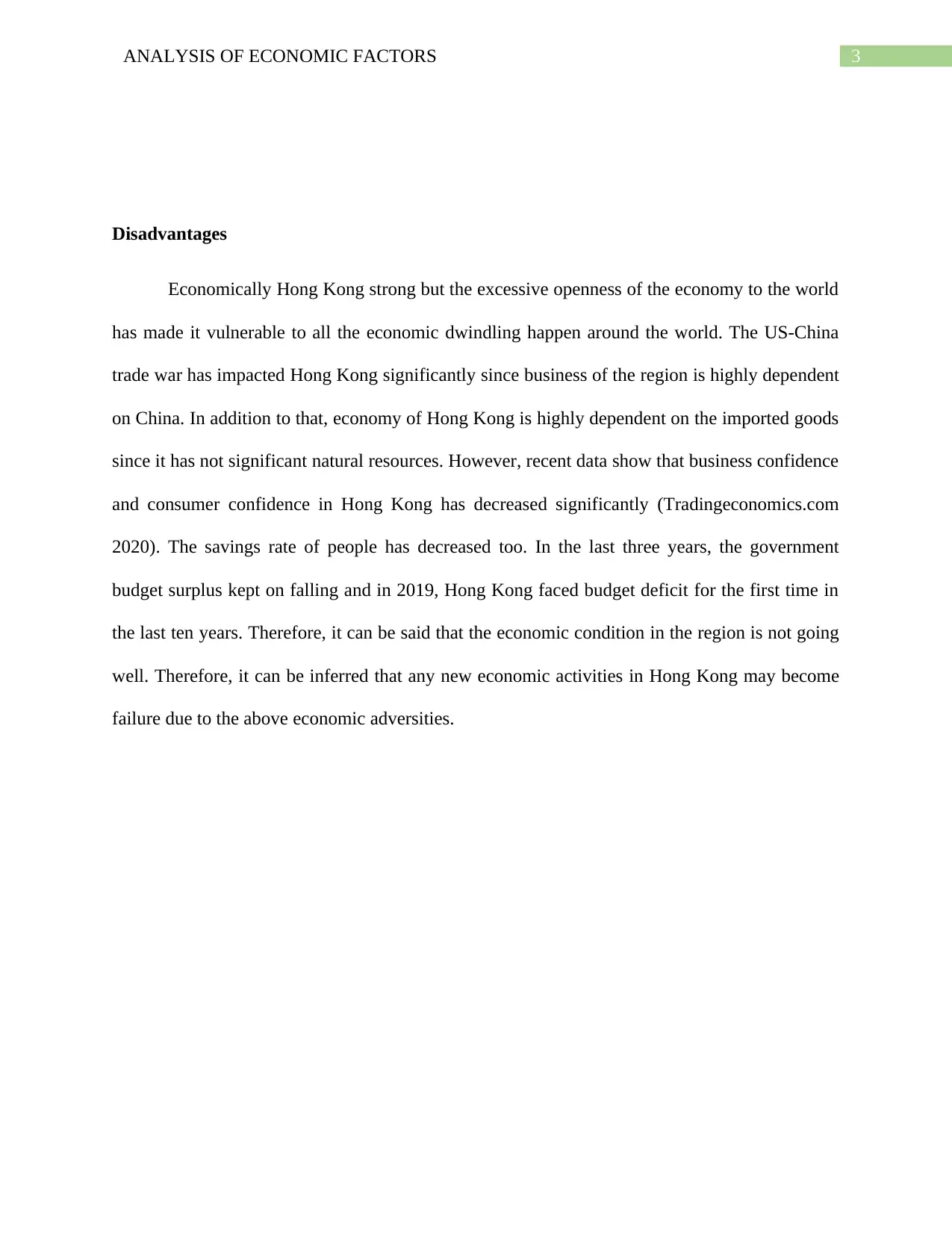
3ANALYSIS OF ECONOMIC FACTORS
Disadvantages
Economically Hong Kong strong but the excessive openness of the economy to the world
has made it vulnerable to all the economic dwindling happen around the world. The US-China
trade war has impacted Hong Kong significantly since business of the region is highly dependent
on China. In addition to that, economy of Hong Kong is highly dependent on the imported goods
since it has not significant natural resources. However, recent data show that business confidence
and consumer confidence in Hong Kong has decreased significantly (Tradingeconomics.com
2020). The savings rate of people has decreased too. In the last three years, the government
budget surplus kept on falling and in 2019, Hong Kong faced budget deficit for the first time in
the last ten years. Therefore, it can be said that the economic condition in the region is not going
well. Therefore, it can be inferred that any new economic activities in Hong Kong may become
failure due to the above economic adversities.
Disadvantages
Economically Hong Kong strong but the excessive openness of the economy to the world
has made it vulnerable to all the economic dwindling happen around the world. The US-China
trade war has impacted Hong Kong significantly since business of the region is highly dependent
on China. In addition to that, economy of Hong Kong is highly dependent on the imported goods
since it has not significant natural resources. However, recent data show that business confidence
and consumer confidence in Hong Kong has decreased significantly (Tradingeconomics.com
2020). The savings rate of people has decreased too. In the last three years, the government
budget surplus kept on falling and in 2019, Hong Kong faced budget deficit for the first time in
the last ten years. Therefore, it can be said that the economic condition in the region is not going
well. Therefore, it can be inferred that any new economic activities in Hong Kong may become
failure due to the above economic adversities.
Paraphrase This Document
Need a fresh take? Get an instant paraphrase of this document with our AI Paraphraser
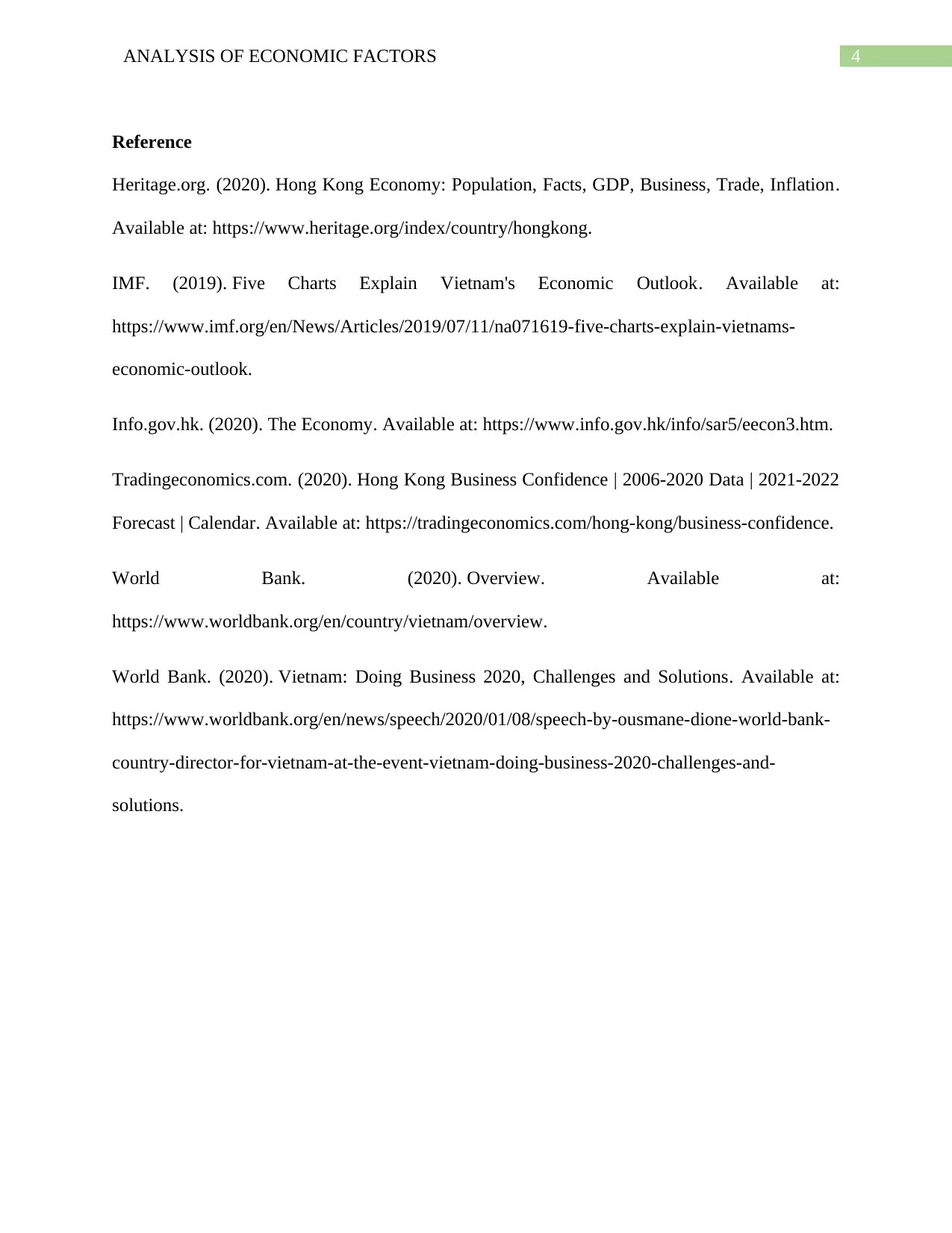
4ANALYSIS OF ECONOMIC FACTORS
Reference
Heritage.org. (2020). Hong Kong Economy: Population, Facts, GDP, Business, Trade, Inflation.
Available at: https://www.heritage.org/index/country/hongkong.
IMF. (2019). Five Charts Explain Vietnam's Economic Outlook. Available at:
https://www.imf.org/en/News/Articles/2019/07/11/na071619-five-charts-explain-vietnams-
economic-outlook.
Info.gov.hk. (2020). The Economy. Available at: https://www.info.gov.hk/info/sar5/eecon3.htm.
Tradingeconomics.com. (2020). Hong Kong Business Confidence | 2006-2020 Data | 2021-2022
Forecast | Calendar. Available at: https://tradingeconomics.com/hong-kong/business-confidence.
World Bank. (2020). Overview. Available at:
https://www.worldbank.org/en/country/vietnam/overview.
World Bank. (2020). Vietnam: Doing Business 2020, Challenges and Solutions. Available at:
https://www.worldbank.org/en/news/speech/2020/01/08/speech-by-ousmane-dione-world-bank-
country-director-for-vietnam-at-the-event-vietnam-doing-business-2020-challenges-and-
solutions.
Reference
Heritage.org. (2020). Hong Kong Economy: Population, Facts, GDP, Business, Trade, Inflation.
Available at: https://www.heritage.org/index/country/hongkong.
IMF. (2019). Five Charts Explain Vietnam's Economic Outlook. Available at:
https://www.imf.org/en/News/Articles/2019/07/11/na071619-five-charts-explain-vietnams-
economic-outlook.
Info.gov.hk. (2020). The Economy. Available at: https://www.info.gov.hk/info/sar5/eecon3.htm.
Tradingeconomics.com. (2020). Hong Kong Business Confidence | 2006-2020 Data | 2021-2022
Forecast | Calendar. Available at: https://tradingeconomics.com/hong-kong/business-confidence.
World Bank. (2020). Overview. Available at:
https://www.worldbank.org/en/country/vietnam/overview.
World Bank. (2020). Vietnam: Doing Business 2020, Challenges and Solutions. Available at:
https://www.worldbank.org/en/news/speech/2020/01/08/speech-by-ousmane-dione-world-bank-
country-director-for-vietnam-at-the-event-vietnam-doing-business-2020-challenges-and-
solutions.
1 out of 5
Related Documents
Your All-in-One AI-Powered Toolkit for Academic Success.
+13062052269
info@desklib.com
Available 24*7 on WhatsApp / Email
![[object Object]](/_next/static/media/star-bottom.7253800d.svg)
Unlock your academic potential
Copyright © 2020–2026 A2Z Services. All Rights Reserved. Developed and managed by ZUCOL.





